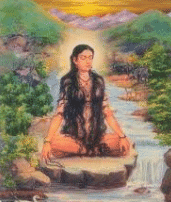पठन सामग्री और व्याख्या - वाख | Hindi Class 9 (Kritika and Kshitij) PDF Download
| Table of contents |

|
| कवि परिचय |

|
| कविता का सारांश |

|
| कविता का भावार्थ |

|
| शब्दावली |

|
कवि परिचय
ललघद का जन्म 1320 के आस-पास कश्मीर स्थित पाम्पोर गांव में हुआ था। ललघद को लल्लेश्वरी, लला, ललयोगेश्वरी, ललारीफ़ा आदि नामों से भी जाना जाता है। वे चौदहवीं सदी की एक भक्त कवयित्री थी, जो कश्मीर की शैव-भक्ति परम्परा और कश्मीरी भाषा की एक अनमोल कड़ी मानी जाती हैं। कश्मीरी संस्कृति और कश्मीर के लोगों के धार्मिक और सामाजिक विश्वासों के निर्माण में लल्लेश्वरी का अत्यंत महत्वपूर्ण स्थान है।
ललघद की काव्य शैली को वाख कहा जाता है। इनकी कविताओं में चिंतन और भावनात्मकता का विचित्र संगम है। इन्होंने अपने वाखों के माध्यम से उस समय समाज में व्याप्त धार्मिक आडंबरों का खुलकर विरोध किया है। इनकी काव्य-शैली की भाषा अत्यंत सरल मानी जाती है, जिसके वजह से ललघद और भी प्रभावशाली बन जाती हैं। ललघद आधुनिक कश्मीरी भाषा का प्रमुख स्तंभ मानी जाती हैं।
कविता का सारांश
प्रस्तुत पाठ में कवयित्री 'ललद्यद' के 'वाख' को संकलित किया गया है। इस पाठ में कवयित्री के चार वाखों का हिन्दी अनुवाद प्रस्तुत किया गया है। ललद्यद के प्रथम वाख में ईश्वर प्राप्ति हेतु किए जाने वाले प्रयासों की व्यर्थता का उल्लेख किया गया है। दूसरे वाख में बाह्याडांबरों के विरोध में कहा गया है कि अंतःकरण से समभावी होने के पश्चात् ही मनुष्य की चेतना व्यापक या विस्तृत हो सकती है। तीसरे वाख में कवयित्री यह अनुभव करती हैं कि भवसागर से पार जाने के लिए सच्चे कर्म ही सहायक सिद्ध होते हैं। चौथे वाख में ईश्वर की सर्वव्यापकता का बोध और भेदभाव के विपरीत चेतना का उल्लेख है। अत: कवयित्री ललद्यद ने आत्मज्ञान को ही सत्य ज्ञान के रूप में स्वीकार किया है।
कविता का भावार्थ
(1)
रस्सी कच्चे धागे की, खींच रही मैं नाव।
जाने कब सुन मेरी पुकार, करें देव भवसागर पार।
पानी टपके कच्चे सकोरे, व्यर्थ प्रयास हो रहे मेरे।
जी में उठती रह-रह हूक,घर जाने की चाह है घेरे।।
व्याख्या: प्रस्तुत पंक्तियों में कवयित्री ने नाव की तुलना अपनी जिंदगी से करते हुए कहा है कि वे इसे कच्ची डोरी यानी साँसों द्वारा चला रही हैं। वह इस इंतज़ार में अपनी जिंदगी काट रहीं हैं की कभी प्रभु उनकी पुकार सुन उन्हें इस जिंदगी से पार करेंगे। उन्होंने अपने शरीर की तुलना मिट्टी के कच्चे ढांचे से करते हुए कहा की उसे नित्य पानी टपक रहा है यानी प्रत्येक दिन उनकी उम्र काम होती जा रही है। उनके प्रभु-मिलन के लिए किये गए सारे प्रयास व्यर्थ होते जा रहे हैं, उनकी मिलने की व्याकुलता बढ़ती जा रही है। असफलता प्राप्त होने से उनको गिलानी हो रही है, उन्हें प्रभु की शरण में जाने की चाहत घेरे हुई है।
(2)
खा खा कर कुछ पाएगा नहीं,
न खाकर बनेगा अहंकारी।
सम खा तभी होगा समभावी,
खुलेगी साँकल बन्द द्वार की।
व्याख्या: कवयित्री मनुष्य को मध्यम मार्ग को अपनाने की सीख देती हुई कहती है कि हे मनुष्य! तुम इन सांसार की भोग विलासिताओं में डूबे रहते हो, इससे तुम्हें कुछ प्राप्त होने वाला नहीं है। तुम इस भोग के खिलाफ यदि त्याग, तपस्या का जीवन अपनाओगे तो मन में अहंकार ही बढ़ेगा। तुम इनके बीच का मध्यम मार्ग अपनाओ। भोग-त्याग, सुख-दुख के मध्य का मार्ग अपनाने से ही प्रभु-प्राप्ति का बंद द्वार खुलेगा और प्रभु से मिलन होगा।
(3)
आई सीधी राह से, गई न सीधी राह।
सुषुम-सेतु पर खड़ी थी, बीत गया दिन आह!
ज़ेब टटोली कौड़ी ना पाई।
माझी को दूँ, क्या उतराई?
व्याख्या: कवयित्री कहती है कि प्रभु की प्राप्ति के लिए वह संसार में सीधे रास्ते से आई थी किंतु यहाँ आकर मोहमाया आदि सांसारिक उलझनों में फंसकर अपना रास्ता भूल गई। वह जीवन भर सुषुम्ना नाड़ी के सहारे कुंडलिनी जागरण में लगी रही और इसी में उसका जीवन बीत गया। जीवन के अंतिम समय में जब उसने जेब में खोजा तो कुछ भी हासिल न हुआ। अब उसे चिंता सता रही है कि भवसागर से पार उतारने वाले प्रभु रूपी माँझी को उतराई (किराया) के रूप में क्या देगी। अर्थात् वह जीवन में कुछ न हासिल कर सकी।
(4)
थल थल में बसता है शिव ही,
भेद न कर क्या हिन्दू-मुसलमां।
ज्ञानी है तो स्वयं को जान,
यही है साहिब से पहचान।।
व्याख्या: इन पंक्तियों में कवयित्री ने बताया है कि ईश्वर कण-कण में व्याप्त है, वह सबके हृदय के अंदर मौजूद है। इसलिए हमें किसी व्यक्ति से हिन्दू-मुसलमान जानकार भेदभाव नही करना चाहिए। अगर कोई ज्ञानी तो उसे स्वंय के अंदर झांककर अपने आप को जानना चाहिए, यही ईश्वर से मिलने का एकमात्र साधन है।
शब्दावली
- वाख: चार पंक्तियों में लिखी गयी कश्मीरी शैली की एक गाए जाने वाली रचना है।
- कच्चे सकोरे: स्वाभाविक रूप से कमजोर।
- रस्सी कच्चे धागे की: कमजोर और नाशवान सहारे।
- सम: अंतः करण तथा बाह्य इन्द्रियों का निग्रह।
- समभावी: समानता की भावना।
- सुषुम-सेतु: सुषम्ना नाड़ी रूपी पुल।
- जेब टटोली: आत्मलोचन किया।
- कौड़ी न पाई: कुछ प्राप्त नही हुआ।
- माझी: नाविक।
- उतराई: सद्कर्म रूपी मेहनताना।
- थल-थल: सर्वत्र।
- शिव: ईश्वर।
- साहिब: स्वामी।
|
16 videos|226 docs|43 tests
|
FAQs on पठन सामग्री और व्याख्या - वाख - Hindi Class 9 (Kritika and Kshitij)
| 1. "वाख, क्षितिज" पाठ का मुख्य विषय क्या है? |  |
| 2. इस पाठ में कौन-से प्रमुख पात्र हैं और उनकी भूमिका क्या है? |  |
| 3. "वाख, क्षितिज" पाठ से हमें क्या सीखने को मिलता है? |  |
| 4. पाठ के प्रमुख विचार क्या हैं? |  |
| 5. "वाख, क्षितिज" पाठ का भाषा और शैली क्या है? |  |





















